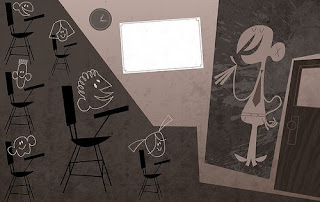Evolving applications
Bombarding me with so much new information
2 many choices
. (pointing) me into the "right" direction
0 (zer0) tolerance for narrow-mindedness because it's just going to keep on developing with or without me & you...
A not so long time ago,...
Before I started this course, I was mainly and Web 1.0/(read-only) user with the exception of Facebook. Soon enough I was knee deep no more accurately "hip deep" in Web 2.0/ (read-write ideology. What changed? "Internet users [can] publish information online almost as easily as they can read online, and they have tremendous potential for learning" (Rosen). Personally, I think to say that Web 2.0 allows users to "publish information online" is an understatement. What we CAN actually publish is A LOT such as " blogs (personal publishing), wikis (collaborative publishing), real simple syndication (RSS), content aggregators, streaming video (YouTube), file sharing, podcasting, and social networking (MySpace)"(Mills). So, you didn't make it on Canadian Idol or So You Think You Can Dance Canada, etc. It's not the end of the world! You can still do what you love to do and share with people all around the world with YouTube. The same can be done with writing. There are very few limitations. Also, the statement that Web 2.0 allows users to "have tremendous potential for learning" is absolutely correct. "With Web 2.0, the focus is not on software, but on practices such as sharing thoughts and information through self-publishing and harnessing the collective intelligence of all users to generate information and solve problems. These technologies are creating huge changes in how educators and students receive and respond to information" (Mills).
I think the key here is "receive and respond to information". We have been using textbooks, tests, essays, reports on paper far too long. Paper is quite limiting actually. There are only a few ways to express your ideas 1. write it down 2. draw it 3. use it as a prop... anything else I'm missing? But you get my drift don't you? With Web 2.0, students can make videos, make voice recordings, create collages, write, share, edit, get feedback from everywhere, etc. And there are more new applications being conjured up as we "speak". Wait that's not the best part yet... at least my students, enjoy using the computer to do their work. I get moans and groans when I ask them to write an in-class essay. However, when I transfer the essay format to the computer, I get less moans and groans. I also found my students writing performances improved not just because of spell check and grammar check. I haven't quite pin pointed the real cause for this. It could be as simple as font recognition. Most of what our students read is typed and so, sometimes if they come across a word that they question the spelling, perhaps it's clearer to see it in the form they first learned it in? Another reason could also be the legibility of the writing. I know many of my students can't read their own writing, so, how can I? ( Though I personally don't like this argument very much....) Or perhaps it's the fact that we gloss over errors as simple typos and not as misspelled words? (I know this is how online provincial exam markers are trained to do.) Even though I'm an English teacher, I would almost go as far as perhaps some rubrics focus too much on the conventions of the English language and not on the "bigger" picture. How useful is learning how to spell thousands of words correctly when in their future everything will be typed and spell checked will be automatically used? Shouldn't we spend more time on how to express what they are feeling, thinking, learning, etc. instead? Especially since there is no "idea check", "opinion check", etc. Anyhoo, this is just one aspect of expression through writing. The point is there are so many more options available with the Web 2.0 tools today and in the future.
I personally like working with technology. I think the funniest things would be how I was considered to be on the higher end of my old school's staff as being technologically able. But once this course started rolling, I was intimidated by how much there was out there that I didn't know! Living in China, is like living in a bubble. The "Great Firewall" of China can be very frustrating. How so? Well, China highly censors everything before allowing it in the country. Be it books, news, information, anything and everything. Occaisionally, there would be several days that we can't access our hotmail accounts. For the last few months before I left for summer vacation, we could not use YouTube because it was blocked. Many blog sites are blocked such as Blogger, Wordpress, etc. My husband is writing his last entry before we return in anticipation that it will still be blocked. The official Twitter update after several searches: "Sites currently blocked in China inc. YouTube, Blogger, Facebook, Twitter, Wordpress, Flickr, Tumblr, technorati, Picasa web albums, Scribd" posted by tvnewswatch 1 day ago.... Wow, and that was only 140 characters, if this tweet was allowed more...
Security of Web 2.0
Back in 2007, the first Web 2.0 worm was created which forced MySpace.com to temporarily shut down because this worm allowed Kamkar (the creator) to control the the browser of any one who visited the site. This bug didn't threaten the users' computers but their data online was jeopardized (Albro). This was a big struggle of mine throughout the course. How our data would be used, passed on, stored, etc. As time went on, every new app we had to sign up for more or less asked for the same information. I felt like it was routine and it wasn't any new information that I was putting out there. I also became more comfortable with posting videos and podcasts that I made when I knew the purpose of making it was to be posted for an audience. I don't feel like I've sold my life information online. Though I am very careful not to post too much details about certain events on apps like Facebook. Unfortunately, not all my colleagues and friends have learned about the Facebook Etiquettes! A few days before the wedding, one colleague sent a wall message to another colleague about the date, time, locations of the wedding. So, the entire details of my wedding was posted on their Facebook walls and the newsfeed. My husband and I saw this on the newsfeed and were not impressed! I addressed them individually about the issues of privacy on Facebook etc. My husband and I do not have students on our Facebook, however, they might have students on theirs who can access that information. Luckily, we didn't experience any wedding crashers. I still feel that this is still an issue. Sure, we know what Facebook does with our information, but others don't and sometimes they give that information out unknowingly.
In the not so distant future...
I would like to keep up with the Web 2.0 apps that I am able to access while in China for the school year. I would like to create a new small goal for my personal ProD, which is every week I will try out one of the new apps that my RSS feed Free Technology for Teachers posts and blog about my experience using that tool. I think this will help me stumble upon new great discoveries for the library and the classroom. I will continue to follow some Twitter Tweets from Library 2.o, YALSA, Library Journal, ebooklibrary, etc on my iGoogle - hopefully there's a flaw in the firewall of China. Otherwise, I still have the RSS feeds from Google reader and I can access those that are not on official blog sites to stay current with what happening in the Web 2.o world. I will continue to use Facebook carefully, since all my colleagues from the old campus are avid users of Facebook, so we can keep in touch.
Resources:
The Next Wave Now: Web 2.0. By: Mills, Lane B.. Education Digest, Dec2007, Vol. 73 Issue 4, p4-5
Is Web 2.0 Safe? PC World Edited by:Albro, Edward N. and Robert McMillan, Jul2007, Vol. 25 Issue 7, p18-20, 3p



